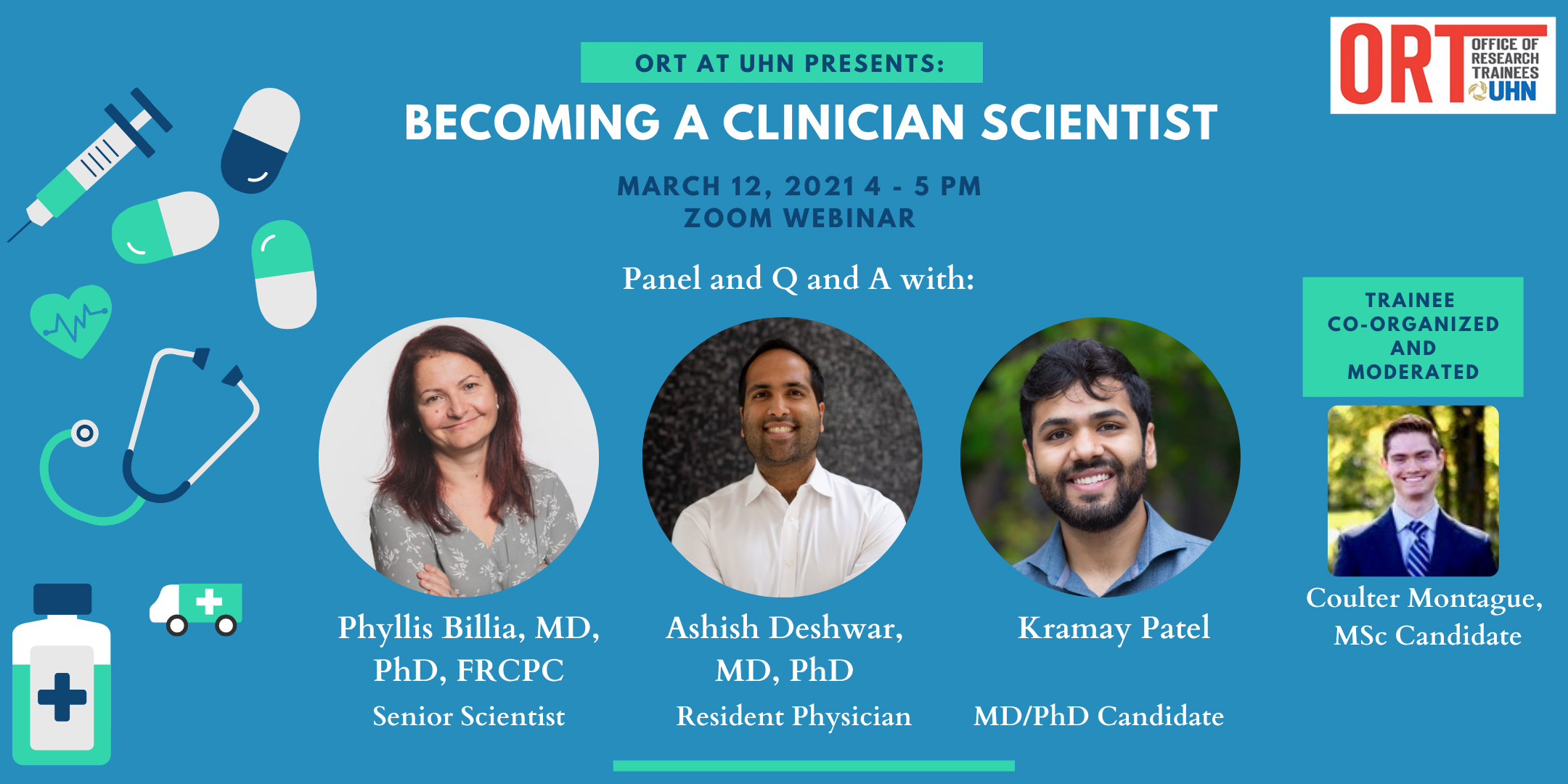
Watch on YouTube
Date
March 12 | 4 pm
Description
Clinician scientists play instrumental roles at the intersection of research and medicine.
The ORT at UHN invites you to a workshop on “Becoming a Clinician Scientist” to explore different paths to this fascinating career. Attendees will learn from three scientists at different stages of their clinician scientist careers: a MD/PhD Candidate, a Resident Physician and a Senior Scientist.
Join us on Friday March 12th from 4-5 pm for a virtual panel discussion and Q and A with:
Dr. Phyllis Billia, Senior Scientist, Toronto General Hospital Research Institute (TGHRI); Director of Research, Peter Munk Cardiac Centre; Associate Professor, University of Toronto
Dr. Ashish Deshwar, Medical Genetics and Genomics Resident, University of Toronto
Kramay Patel, MD/PhD Candidate, Institute of Biomedical Engineering/Krembil Research Institute
This event has been organized with the help of UHN trainee Coulter Montague, Master’s Candidate at McEwen Stem Cell Institute. The event will be moderated by Coulter!
Presenter
Dr. Phyllis Billia: Dr. Billia is a member of the Division of Cardiology at the University Health Network and a Scientist at the Toronto General Research Institute. She completed her medical and research training at the University of Toronto and she is a graduate of the Medical Biophysics PhD program. Recently she completed a post-doctoral fellowship with the world-renowned Dr. Tak W. Mak at the Campbell Family Institute for Cancer Research. She currently is the co-Director of the Peter Munk Cardiovascular Biobank and Medical Director of the Mechanical Circulatory Assist Program. She has embarked on her own research career with funding from the Canadian Institutes of Health Research, focusing on understanding the molecular underpinnings of disease progression in patients with heart failure. In particular, her laboratory is examining how tumor suppressors and regulators of metabolism can coax the terminally differentiated cardiomyocyte back into cell cycle to provide a potential for repair post-injury. She also has an interest in disease modeling in a dish using induced pluripotent stem cell technology.
Dr. Ashish Deshwar: Dr. Ashish Deshwar is a third year Medical Genetics and Genomics resident at the University of Toronto. Prior to residency, Dr. Deshwar completed the MD/PhD combined program at the University of Toronto, graduating with a Doctor of Philosophy degree in Molecular Genetics in 2016 and a Doctor of Medicine degree in 2018. His research interests involve leveraging the zebrafish model organism and human cell-based models in the discovery and characterization of novel genetic disorders. He also has an interest in RNA sequencing as a diagnostic tool in rare disease. He is the recipient of numerous prestigious awards including the Vanier Canada Graduate Scholarship and the Lieutenant Governor’s Gold Medal.
Kramay Patel: Kramay Patel is a MD/PhD Candidate, currently completing his doctoral thesis at the Institute of Biomedical Engineering at the University of Toronto, with a focus on neurofeedback and cognition. He received his Bachelors of Applied Science and Engineering degree with a major in Biomedical Systems Engineering and a minor in Robotics and Mechatronics from the Engineering Science Program at University of Toronto in 2016. His graduate work has been funded in part, by the Vanier Canada Graduate Scholarship. His doctoral thesis focuses on investigating the feasibility of self-regulating brain activity through intracranial neurofeedback, specifically in memory-related structures of the brain.

